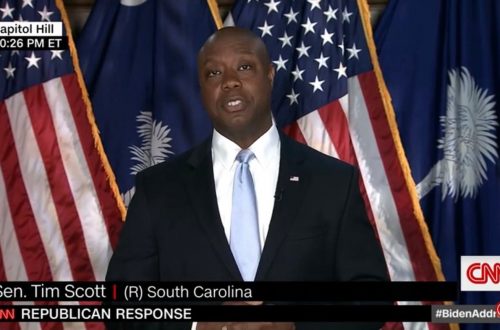 Paul Krugman of the New York Times is at least a little bit “giddy” about the results of last Tuesday’s elections. Krugman feels this way not just because the results marked the end of a Republican “reign of error,” but also because he believes “that this election marks the beginning of the end for the conservative movement that has taken over the Republican Party” (see Krugman’s Op-Ed, “The Great Revulsion“).
Paul Krugman of the New York Times is at least a little bit “giddy” about the results of last Tuesday’s elections. Krugman feels this way not just because the results marked the end of a Republican “reign of error,” but also because he believes “that this election marks the beginning of the end for the conservative movement that has taken over the Republican Party” (see Krugman’s Op-Ed, “The Great Revulsion“).
I’m not convinced, however, that Krugman’s analysis of the election results is on target. Dr. Gary C. Jacobson is a professor of political science at University of California, San Diego and an expert on congressional elections. He was interviewed by Newsweek after the election and was asked if the Democrat sweep of Congress indicates a nationwide shift to the left. Dr. Jacobson responded:
There was a national trend towards the Democrats, but this election doesn’t portend any fundamental reordering of people’s political preferences. It’s much more of a short-term reaction to a current administration and a current set of policies. There are a still a lot of partisans who vote that way down the line. Democrats and Republicans each voted with their party by margins of 90 percent or more. The real difference was the independents and moderates. They went strongly Democratic by more than 55 percent. About 22 percent of voters call themselves independent, and of those, only 5 or 6 percent are truly independent, the others lean toward one party or another but are persuadable (see “A More Liberal Electorate? Not Yet“).
 My hunch is that Dr. Jacobson probably has a more realistic view of what happened and that Paul Krugman has indulged in a bit of wishful thinking. No matter what one thinks about political coalitions within the Republican party, conservatism is not going away anytime soon among the electorate.
My hunch is that Dr. Jacobson probably has a more realistic view of what happened and that Paul Krugman has indulged in a bit of wishful thinking. No matter what one thinks about political coalitions within the Republican party, conservatism is not going away anytime soon among the electorate.
Conservatism is fundamentally about conserving those cultural institutions and norms that are required to maintain the life and health of a just society. There are many such institutions and norms that are under siege today, and many people still believe that their overthrow would have deleterious effects on our national culture.
Despite Mr. Krugman’s claims, there are reasons to believe that many Americans desire to conserve cherished ideals such as the family and the rights of the weakest in our society. The Republicans may be out of power in Congress, but that hardly amounts to the end of conservatism. In fact, it may be an indication that the Republicans were not as conservative as they should have been.




14 Comments
Paul
Denny,
make that THREE things we agree on!
dennyrburk
Woohoo! Three whole things! 🙂
Matt Stokes
Republicans lost, but conservatism didn’t. The Dems won by moving to the right…if the GOP can right the ship, then things will work out in the end.
light
I actually agree with Denny too. People are turned off about conservatives because of neocons like Bush and Cheney, but come election day ’08, they’ll vote Republican again, a different type of Republican, hopefully not as extreme or maybe a moderate one, I hope.
Debbie Wimmers
Matt said: Republicans lost, but conservatism didn’t. The Dems won by moving to the right…if the GOP can right the ship, then things will work out in the end.
When did the democrats turn to the right? That’s news to me. If they did, they’re trying to decieve us into thinking we can rely on them. The only honest thing they have is being open about gay marriage and abortion. There maybe closet democrats who feel the same way we do.
Paul
Debbie,
again, where do you get your news from? There have always been socially conservative democrats out there, just as there have always been republicans who are civil libertarians. There were plenty of republicans who voted against the gay marriage ban, and there are plenty of republicans who are pro-choice.
I am so tired of the “republicans=good, democrats=evil” line. Especially because those who espouse it lie through their teeth to be able to say it.
Debbie
All I’m saying is that the democratic platform is for gay unions and abortion. Like I said, there are some that do not support that party view. Then the republicans are just the opposite.
What about people like Jimmy Carter who is a southern baptist has spoken for his party agenda and Joe Leiberman who is Jewish said the same thing? Zell Miller was one very good conservative democrat. Republicans like McCain and Guilliana, plus a few others whose platform is Christian Values don’t live up to that standard.
Paul
Debbie,
so is that all the democrats stand for?
and is the entirety of the republican platform being for opposition to gay marriage and being pro-choice?
I mean, if that’s all there is, then this is one boring country.
Paul
whoops, meant to say pro-life. I think you got my point however.
light
Debbie,
You said:
“All I’m saying is that the democratic platform is for gay unions and abortion. Like I said, there are some that do not support that party view. Then the republicans are just the opposite.”
So there are no deviants in the republican party? One republican, any random one, represents all republicans? If you’ve ever done any quantitative research or read about it, you’ll find that there is always a measure of deviance(standard deviation) and some factors that are not statistically significant, but that doesn’t mean that they should be ignored. The researcher addresses in the research report, reasons why it was not statistically significant and at the end of the report, the researcher has to list limitations of the study and possible approaches for further research. Just because something is not expressed as significant, doesn’t make it insignificant or a thing to be disregarded.
Like Paul said, there are all types of Republicans and all types of Democrats: moderates, middle men, extremists(i.e. neoconservatives), very liberal, Socialist Libertarian, or Originalists.
Light
debbie
But it is still a majority of issues that the particuler party supports. Most republicans and democrats support thier platforms. Like I said, there are some.
Paul
so what are the other things on the platforms of both parties, Debbie?
Debbie
I’m just addressing the hot button issues that most politicans support.
Paul
the hot button issues are about 5% of what matters politically. If that’s what you’re basing your votes on, then you really need to do your city, county, state, region, country and world a favor and not vote.
So, I ask again, because it’s important, what’s the rest of the two parties’ platforms?